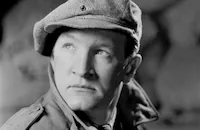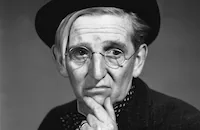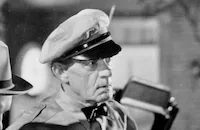Taxi, Mister
Brief Synopsis
Cast & Crew
Kurt Neumann
William Bendix
Joe Sawyer
Grace Bradley
Sheldon Leonard
Joe Devlin
Film Details
Technical Specs

Synopsis
At an awards ceremony for the Red Checker Taxicab Company, vice-president Eddie Corbett tells his girl friend, Lucy Gibbs, the story of how he and president Tim McGuerin started out together years before: Eddie and Tim take turns driving their company's single cab, until one day a drunken passenger insists they both accompany him to a burlesque show where beautiful Sadie O'Brien dances. Tim falls desperately in love with her, as does club owner Glorio, who is hiding his past as notorious gangster The Frisco Ghost. When Sadie falls in Tim's lap by accident, he manages to grab her garter and hangs it from his rearview mirror, where she sees it when she takes his cab a few days later. Unaware of her identity, Tim rhapsodizes about the garter's owner, and eventually she reveals herself and kisses him. Although Glorio tries to woo Sadie with diamonds, she prefers Tim's gentleness, causing Glorio to grow jealous. One night he follows Tim and Sadie to the garage, where Tim is showing off his treasure, a second cab that, as yet, has no engine, and assumes that the two have been intimate. In revenge, he frames Tim and Eddie during their baseball game, planting illegal alcohol and guns in their car and tipping off the police. When they are arrested, the gun is found to have the fingerprints of The Frisco Ghost on it, and the police attempt to force Tim and Eddie to talk using water torture, the sound of which only serves to exasperate the police. Meanwhile, Sadie asks Glorio's goons to procure a cab engine so she can surprise Tim with it, and after a released Tim drives to her club, the thieves mistakenly steal the engine from that cab, then secretly install it in his second cab. As Tim confesses his jailbird status to an amused Sadie, Eddie rushes to tell Tim and Sadie that the second cab is, miraculously, working. Just then, Glorio arrives, pursued by the police, and after a gunfight, Tim throws a wrench at Glorio and apprehends him, thereby earning the $10,000 reward for catching The Frisco Ghost.

Director
Kurt Neumann
Cast

William Bendix

Joe Sawyer
Grace Bradley

Sheldon Leonard
Joe Devlin
Jack Norton
Frank Faylen

Mike Mazurki

Sig Arno

Clyde Fillmore

Jimmy Conlin

Lew Kelly

Iris Adrian
Lona Andre
Crew
Richard Currier
Fred Guiol
Charles D. Hall
Clarence Marks
Eddie Montagne
Robert Pittack
William Randall
Hal Roach
Royer
Roy Seawright
Earle Snell
William L. Stevens
Edward Ward

Film Details
Technical Specs

Articles
Taxi, Mister
The Bendix-Sawyer streamliners, beginning with Brooklyn Orchid (1942), a reworking of the 1931 Laurel and Hardy film for Roach, Come Clean, took place in the eponymous New York borough with the actors playing, respectively, Tim McGuerin and Eddie Corbett, owners of a taxicab company whose peregrinations around the city led them into comic misadventures, sometimes involving McGuerin's socially ambitious wife Sadie, a former burlesque star. Sadie was featured more prominently in the second film of the "Taxi Trilogy," The McGuerins of Brooklyn (1942). The 46-minute Taxi, Mister (1943) was the final film in the series. By this time, Hal Roach had already begun the process of converting his facility from production of entertainment features to making military training films. According to another Hollywood Reporter news item, some scenes in Taxi, Mister were shot at the Veteran's Administration in Sawtelle, CA.
The plot of Taxi, Mister takes McGuerin and Corbett back several years in a flashback to the beginnings of their successful company, when they were still struggling to buy an engine to get a second cab running. Set in 1928, the story relates how Tim and Sadie met when she was still working in a burlesque house run by Louis Glorio, who was in reality the notorious gangster The Frisco Ghost. Sadie's attentions to Tim infuriate Glorio, who plants guns and illegal liquor in the boys' cab, then turns them in to the police. After an inept attempt at water torture to get Tim and Eddie to confess, the cops realize their mistake and go in pursuit of Glorio. The outcome unexpectedly provides the taxi drivers with the money they need to get their business going full steam.
Bendix continued to perform notable character roles in major features while doing the Roach series, including supporting parts in the crime thriller The Glass Key (1942), the Tracy-Hepburn romantic comedy Woman of the Year (1942), and the war drama Wake Island (1942), which earned him a Best Supporting Actor Academy Award nomination. After the trilogy, he moved on to even more important roles, including the screen adaptations of such acclaimed dramas as Eugene O'Neill's The Hairy Ape (1944) and William Saroyan's The Time of Your Life (1948) with James Cagney. His leading roles included the baseball legend in The Babe Ruth Story (1948) and a regular-Joe factory worker in the B comedy The Life of Riley (1949), which was based on a story by Groucho Marx. Four years later, Bendix played Riley again in a long-running television sitcom of the same name. Because of his accent, he was often cast, as he is here, as a Brooklyn native; in fact, he was born and raised in Manhattan.
In 1937, Grace Bradley, who plays Sadie, had married William Boyd, the star of the popular Hopalong Cassidy series, and she left show business after Taxi, Mister--but not before performing a bewitching "hoochie-coochie" routine to entice Bendix as the young Tim. According to the Hollywood Reporter, the number, as originally performed by Bradley, had been banned from her earlier picture, Come on, Marines (1934). She was married to Boyd until his death in 1972, and her remaining years were devoted to preserving and promoting her husband's memory and to the support of children's hospitals in Southern California. She died in September 2010 on her 97th birthday.
Sheldon Leonard (Glorio/Frisco Ghost) was known for playing gangsters and tough guys, often comic ones, most memorably as Harry the Horse in the musical Guys and Dolls (1955). Later in his career, he became an important television producer-director, responsible for such hit series as The Dick Van Dyke Show, The Andy Griffith Show, and I Spy.
There is some confusion about titles in this series, thanks largely to a reissue of the material later in the decade. Some sources list Two Mugs from Brooklyn as an alternative title to both this film and The McGuerins of Brooklyn. Scenes from both pictures were edited together into a longer (71 min.) feature released in 1949 under the title Two Knights from Brooklyn, which some sources claim also bore the Two Mugs title. It was an attempt by Roach to recapture the popularity of the pre-war comedies; he also tried reuniting Sawyer and Tracy as their same characters from the military comedies, now a police officer and a reporter, in Here Comes Trouble (1948), but the resurrected team failed to catch on with the public.
Director: Kurt Neumann
Producers: Hal Roach, Fred Guiol
Screenplay: Clarence Marks, Earle Snell
Cinematography: Robert Pittack
Editing: Richard Currier
Art Direction: Charels D. Hall
Original Music: Edward Ward
Cast: William Bendix (Tim McGuerin), Grace Bradley (Sadie), Joe Sawyer (Eddie Corbett), Sheldon Leonard (Glorio/The Frisco Ghost), Joe Devlin (Henchman Stretch), Jack Norton (Reginald Van Nostrum).
BW-46m.
by Rob Nixon

Taxi, Mister
Quotes
Trivia
Notes
The print viewed was a reissued, slightly edited combination of Taxi, Mister and another featurette from the "The McGuerin Family" series called The McGuerins from Brooklyn. The reissue was entitled Two Mugs from Brooklyn, and contained partial credits from each film. The above cast credits were taken from the Variety review of Taxi, Mister. According to a Hollywood Reporter news item, some scenes in Taxi, Mister were shot at the Veteran's Administration in Sawtelle, CA. Another Hollywood Reporter item states that the burlesque routine that Grace Bradley's character dances to bewitch William Bendix's character in this film had originally been banned from the 1934 film Come On Marines. For further information on "The McGuerin Family" series, consult the Series Index, and see the entry above for Brooklyn Orchid. Taxi, Mister was also one of Hal Roach's "streamlined features," a series of short comedies intended to fill the second half of a double bill. The first streamlined feature was Tanks a Million.














